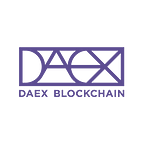“What To Make Out of Bakkt?” by DAEX Chairman, Benjamin Gu
Benjamin Gu, Chairman of the Global DAEX Foundation, recently published an article on LinkedIn titled “What To Make Out of Bakkt?”. Benjamin highlights the business and logical concepts behind the Bakkt project, and how he thinks other retailers may follow the same path.
Source: https://www.linkedin.com/pulse/what-make-out-bakkt-benjamin-gu/
See Benjamin’s article below:
When I first heard about the news of Bakkt, I couldn’t help but admire the innovative and dynamic nature of the US financial service industry. In the middle of July 2017, CFTC granted cryptocurrency derivatives trading and clearing licenses to LedgerX. At the end of the same month, CBOE began to apply to list a bitcoin future product that will be settled with cash. A couple of weeks later, not to be left behind, CME also began to apply to list bitcoin future product that will also be settled with cash. So, in December 2017, CME and CBOE began to list bitcoin futures, and LedgerX began to list bitcoin options. Presently, in August 2018, ICE announced that it will list its own cryptocurrency derivatives product, one day bitcoin future that will be settled physically. This new trading product itself is already very unconventional. What is more interesting in the announcement is that Starbuck will work with ICE in this new venture. Why would a retailer work with an exchange? What does Starbuck set to gain from this cooperation? What is the synergy between the two? Why would an exchange go out of its way to get a retailer involved? With these questions in mind, I try to figure out the business and technical logic behind this venture.
According to Bakkt CEO Kelly Loeffler, Bakkt is “a company that will enable consumers and institutions to buy, sell, store and spend digital assets on a seamless global network.” And it “will work with companies that include BCG, Starbucks, Microsoft and others, to create an open ecosystem that supports growing needs in the ~$270 billion digital asset marketplace.” OK, based on the above information, here is what I think Bakkt will do.
· A permissioned chain will be built to support the issuance, circulation, storage and trading of digital assets.
· A wallet will be built to support digital assets issued on this chain, as well as mainstream digital assets such as bitcoin and Ethereum. The wallet will provide payment and trading services.
· A futures exchange will be built initially. It does not say that it is also going to build a spot exchange. But adding a spot exchange should be an easy job, especially when the underlying chain and wallet are available.
· ICE is going to provide trading service on top of this chain. The clearing, settlement and asset custodian work will be done on this chain.
· Starbucks is going to provide one payment usage for digital assets on the chain to customers all over the world.
· BCG provides business advices for this venture.
· Microsoft is going to use its cloud service to provide the technical infrastructure for this chain, making it reliable, safe, scalable and speedy.
With all these critical pieces in place, it looks like that Bakkt can indeed achieve what it sets out to do. However, there are still some issues I am not quite sure about.
First of all, retailers only care about stable value tokens. Such tokens may be in digital form or simply fiats. A token with variable value is of no use to participants in the retail industry. On the other hand, exchanges only care about variable value tokens, for which they can provide trading service. Exchanges can use fiat or stable value tokens to trade variable value tokens. So, I wonder what benefits does Starbuck get from working with an exchange?
Secondly, if the purpose of this venture is to provide a packaged service to customer’s digital assets, there is still one critical part missing. That is, an organization that provides digital asset management service. For customers who are not interested in trading in the secondary market, they should have an organization that loans out their digital assets and receive interests. May be, Bakkt is waiting for banks to catch up. I hope that Bakkt already allocated some equities for such a bank.
Thirdly, Bakkt says it is going to build an open ecosystem. Bakkt is also right in this direction. With cryptoeconomy gaining more grounds, it is already dated nowadays if a new venture is going to do everything on its own, especially in the digital asset world where tokens are being used to stimulate and reward participants to make contributions. If the cryptoeconomy model is done right, it can attract and guide efforts of all small participants. I would expect that Bakkt will issue its own token in this ecosystem. The token will help further attract more players into this ecosystem. And this will pose serious threats to other big names. I am sure that other big names will react quickly. I wouldn’t be surprised if a Nasdaq, McKinsey and McDonalds combo appears in the near future.
Follow us online to stay up to date with news and information from DAEX:
Website: www.daex.io
Twitter: https://twitter.com/DaexBlockchain
Telegram: https://t.me/DAEXOfficial_en
Medium: https://medium.com/daex
Reddit: https://www.reddit.com/r/DAEX_Blockchain/
YouTube: https://www.youtube.com/channel/UCqgUNUY8fM6-XIbweKrYL0w
Facebook: https://www.facebook.com/daexblockchain/
LinkedIn: https://www.linkedin.com/company/daex-blockchain-group-limited/
